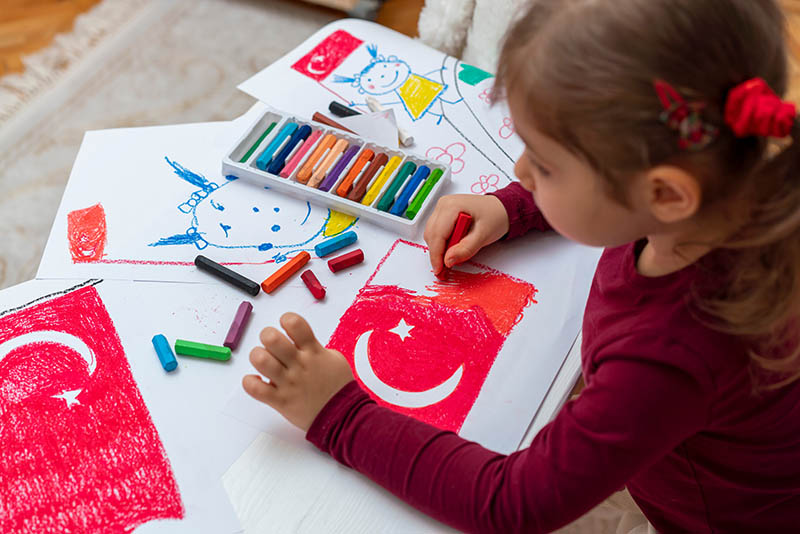Teaching English to Young Learners (TEYL) refers to TESOL / TEFL methodology used for young learners between the ages of 4 and 17. TEYL methods can be used in:
K-12 Teaching Jobs
- TESOL / TEFL certified teachers teaching English abroad in public schools, private international schools, or private after school ESL academies in a foreign country.
- Licensed teachers (at the state / provincial level in USA and Canada) teaching math, art or science lessons to non-native English speaking students in a foreign country or at home.
ESL Immersion Teaching Jobs in Canada or the United States:
- ESL immersion programs are generally geared towards young adults looking for university pathway programs and those adults who need to improve their English skills to qualify for better jobs internationally. However, in recent years, English Immersion Programs are growing in the TEYL segment for teenagers between 12 and 17 years of age who spend the summer learning English in Canada or the United States.
Teaching One-to-One Jobs:
- Private tutoring and online tutoring is also a growing market. In some countries, young learners represent the largest job segment for online ESL teaching jobs.
Learn more about international TESOL jobs
What’s the Difference Between Teaching English to Adults and Young Learners?
The same communicative and task-based approaches used for teaching English to adults can also be used for teaching English to children and teenagers. All ESL students learn English more effectively if the language presented and practiced in a meaningful and authentic context.
The main differences with young learners are their level of English, energy, interest, and motivation, which has an impact on the types of activities and games that work effectively in the TEYL classroom.
Download Brochure
Let us answer all your questions and help you start your career in TESOL!
About TEYL Students
Children and teenagers must be allowed to play an active part in the process of mastering skills and extending their knowledge of the world around them.
To ensure that they play an active part in the learning process, teachers need to arouse and maintain interest by providing an environment that will enable them to talk and act as if they were living a real experience. Essentially, young learners are not much different than adults when it comes to effective language learning. All ESL students learn language better through communicative and task-oriented lessons, but teachers need to adapt to the different characteristics of young learners accordingly.
Characteristics of TEYL Students:
- Children are lively and kinesthetic beings. As they grow, young learners balance their high levels of energy with critical thinking and independence.
- Young learners may become completely absorbed in both physical and mental activity. On the other hand, their concentration does not last very long;
- Younger students are less self-centered in their personal relationships, and more ready to form groups and take part in team activities and games;
- Their general intelligence increases steadily and special abilities begin to emerge toward as they grow. Their capacity to form concepts also increases, although some concepts are slow in developing;
- Young students memorize easily at this age. Good and bad experience have long-lasting effects.
Tips for Teaching English to Young Learners:
- TEYL teachers must select and present materials to young learners in a way that makes learning as enjoyable as possible;
- While learning will depend to a large extent on listening and imitating or modeling the language through drills and repetition, young learners will learn more effectively by using the language as freely as possible within their own limits.
- Play is a natural form of expression and supports language learning through memorable experiences.
- Create classroom situations that reproduce activities that your young learners participate in the outside world.
- Young learners should understand that fun activities lead toward a learning objective. This is perhaps best achieved by showing students how the language is of use to them now.
Read: Using Task-based Learning Activities with Young Learners
What is a TEYL Certification course?
TEYL certification courses are generally offered by TESOL / TEFL institutes as a short module spanning 5 to 20 hours of training. Some courses include TEYL training in the standard course, but the majority offer it as a separate specialist to add to the TESOL / TEFL certification course.
Do I Need to Complete a TEYL Certification Course?
Standard TESOL / TEFL methodology is geared toward teaching English to adults. World-renowned programs such as CELTA, Trinity CertTESOL, and OnTESOL cover the methods and lesson planning formats that English teachers need to apply with different levels of ESL students. These methods can be adapted for young learners; however, teachers need training on how the communicative and task-based approaches work with young learners. Activities for young learners need to be meaningful, memorable, and appropriate to their level and needs.
For this reason, it is important to take a course that includes TEYL or that allows you to add it to the TESOL / TEFL certification course as a specialist module. The 20-hour TEYL certification course offered by OnTESOL is unique because it includes one Lab Assignment where trainees have to create a detailed lesson plan using Task-based Learning with young learners, thus broadening the set of lesson planning skills trainees learn during the standard TESOL course.
Save CA $200 / US $160 on Your Online TEYL Certification Course!
Those who add the 20-hour TEYL specialist to the online 120-hour TESOL certificate course save CA $200 / US$160 on their TESOL certification program. This TESOL and TEYL combination is recommended for K-12 teachers and ESL teachers planning to teach English to young learners at home or abroad.






I have a MBA degree,Please can you guide me, between TEFLand TEYL,which is better?Please send me some sample examination papers of above mentioned courses.
Regards.
TEFL (Teaching English as a Foreign Language) provides foundational skills to teach English to non-native speakers of all ages, offering flexibility in teaching various age groups.
TEYL (Teaching English to Young Learners) is a specialized certification you can pursue after obtaining your TEFL. It equips you with specific strategies to effectively teach English to children.
Key considerations for pursuing a TEYL specialization:
Age Group Preference: TEYL is beneficial if you enjoy working with children.
Job Opportunities: A TEYL certification opens up specialized roles focused on teaching children.
Professional Development: Pursuing a TEYL after your TEFL can enhance your skills and employability.
Future Goals: If you plan a long-term career teaching English to young learners, a TEYL certification is a logical step.
In short, while TEFL gives you a broad foundation, TEYL specialization is beneficial if you aim to focus on teaching English to young learners.
Our 168-hour Hybrid TEFL Certificate includes a TEYL (Teaching English to Young Learners) component, allowing you to gain specialized skills for effectively teaching English to children.